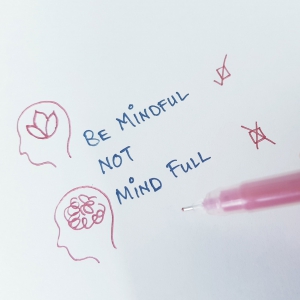Everyone should live in the here and now

How often do you take a moment to reset, relax, listen to the breaths you take, savor the quiet, sit in the here and now?
I help many clients practice mindfulness – living in the moment, experiencing the present and not dwelling on the past or worrying about the future.
Mindfulness allows you to be intensely aware of what you are sensing and feeling at that exact moment, without judgment, blame or guilt. It’s about relaxing the body and mind, so calmness can enter, and stress can escape.
We spend far too much time worrying about tomorrow, stressing over an incident at work or home, or agonizing about the past. These random negative thoughts that often consume us can cause anxiety and lead to depression.
Practicing mindfulness helps direct your attention away from negative thinking and toward positivity.
The benefits are many: focusing on the present moment helps relieve stress, anxiety, pain and depression, to name a few. It also can improve attention, decrease job burnout and help you sleep better. How many times have you laid in bed at night as your mind fills with thoughts of tomorrow and all of its demands? To sleep well, your mind must be in what I call “a good mind space” where calmness and peacefulness can flow. And, how often do your thoughts consume you at work when you feel you have been wronged or a problem did not resolve the way you hoped it would?
Practicing mindfulness can ease the tension by redirecting your thoughts to the present moment and focusing on that moment. Fears and insecurities about the past and the future can make it difficult to focus on the present. Mindfulness can be a very effective tool when you are trying to manage difficult emotions. The key is to pay attention, to be aware.
Mindfulness is rooted in Buddhist and Hindu teachings of enlightenment, which involves a journey of attention, awareness and being present.
So, how do we get to that good mind space?
Begin by sitting down and taking a few deep breaths. Focus on each breath and what you are feeling at that exact moment. Next, try to shift your attention to the thoughts and emotions you are experiencing and allow these to be with you without judgment. Try not to push away unpleasant thoughts; acknowledge them so you can better understand yourself and move forward without anger, fear or negativity. This is the healthy place we all are searching for.
To help you be more mindful, start practicing in the morning when you first wake up. Focus on your breathing and how your body slowly is getting energized for the day. Practice again at lunchtime; take five minutes to reset and find your good mind space. Every day, give yourself at least five minutes to reset. Keep practicing until mindfulness becomes effortless.
Here are a few more simple ways to incorporate mindfulness into your life:
- Pay attention. We live in a fast-paced world and often are looking at what is next instead of experiencing the moment we are in – what we see, hear, smell and taste. Do you remember what you had for breakfast and how it tasted? Do you remember the conversation you had with your partner before you left for work?
- Live in the moment. Intentionally try to focus on everything you are doing at that exact moment. Enjoy the simple pleasures.
- Accept yourself and treat yourself the way you would treat a trusted friend.
- Focus on your breathing. When negative thoughts start creeping in, take a deep breath, close your eyes and focus on your breathing. Doing this simple exercise even for one minute can return your mind to a sense of calmness.
- Meditate. Mindfulness is a form of meditation, which uses different practices to quiet the mind.
The goal of mindfulness is to improve your mental health, to be happy with yourself, to understand and effectively cope with uncomfortable emotions, and to find balance and harmony in your life.
Some clients have asked me if mindfulness can help their relationship and I say “absolutely!” Couples have found they have happier and more satisfying relationships because they are in the moment with their partner, they have directed their attention to that person, they are listening, they are focused on everything their partner is saying and doing. This can, and should, happen in every relationship.
Practice mindfulness and see the results!
